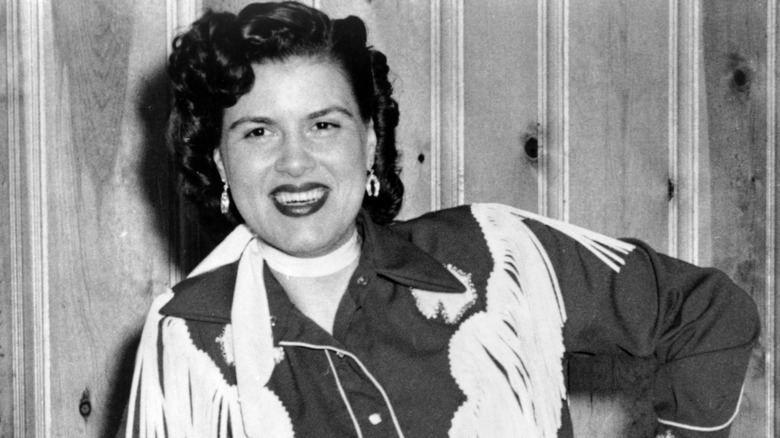When Jimmy Dean Opened the Door: The Backstage Moment That Launched Patsy Cline
It was an ordinary night at Washington D.C.’s Town and Country Time show, a local television program filled with cowboy songs and country spirit. But behind the curtain, a small gesture was about to change the history of American music. Jimmy Dean, the confident and charming host who was already a local celebrity, extended his hand to a young woman waiting nervously in the wings. Her name was Patsy Cline. With a voice rich in heartbreak and power, she stepped into the spotlight for the first time on screen. That moment marked the beginning of a career that would elevate her to one of the greatest female country artists of all time.

Jimmy Dean: The Door-Opener
In the mid-1950s, Jimmy Dean was already on the rise. Known for his easy smile, Texas drawl, and natural ability to connect with audiences, he hosted Town and Country Time, a regional TV show that spotlighted local talent. Dean himself would later become a household name—not only for his chart-topping hit “Big Bad John” but also for his acting career and, unexpectedly, his sausage company that turned him into a business icon.
But in that moment, Jimmy Dean was simply a gatekeeper to opportunity. He had the authority to give newcomers a stage, and on that night, he offered Patsy Cline her first real taste of television. For a girl from Winchester, Virginia, who had been singing in honky-tonks and local radio since childhood, this was destiny knocking.
Patsy’s First Break

Patsy Cline was born Virginia Patterson Hensley in 1932. She grew up in a working-class family, her childhood filled with hardship but also a deep love for music. She idolized stars like Judy Garland and Kate Smith, and by her teens, she was already singing in talent shows and on the radio. Yet her career was far from secure. Opportunities for women in country music were limited, and the industry was dominated by male voices.
When Jimmy Dean called her on stage that night, Patsy’s voice quivered with nerves, but the emotion behind it was undeniable. She sang with a power that came not from training but from life—heartache, resilience, and the hunger to prove herself. The audience, used to polished performances, was struck silent. Dean himself, though not overly sentimental, reportedly knew she had something rare.
Respect, Not Friendship
Later, country singer and songwriter Bill Anderson described the relationship between Dean and Cline as “not quite oil-and-water.” They were not close friends, nor were they adversaries. Instead, theirs was a mix of mutual respect and occasional differences. Dean admired her determination and talent, while Cline respected his role in giving her that first chance. They were very different personalities—Dean was polished and jovial; Cline was bold, fiery, and unafraid to speak her mind. But perhaps that contrast was exactly what made their moment together so significant.
Rising to Stardom
That first TV appearance did not instantly make Patsy a star, but it planted a seed. She began to appear more frequently on local programs and gradually gained recognition. Her breakthrough came in 1957 when she performed “Walkin’ After Midnight” on Arthur Godfrey’s Talent Scouts. The song became a Top 20 pop hit and a No. 2 country hit, catapulting her into national fame.
From there, her career blossomed. Under the guidance of producer Owen Bradley, she crossed the boundary between country and pop with hits like “I Fall to Pieces” and “Crazy,” the latter written by a young Willie Nelson. Her voice—emotive, soaring, and tinged with melancholy—set her apart from every other singer of her era. She was one of the first women in country music to achieve mainstream success, paving the way for future generations.
Jimmy Dean’s Parallel Path
Meanwhile, Jimmy Dean’s own career was flourishing. He became a national television personality, recording artist, and eventually the star of The Jimmy Dean Show. While Patsy and Jimmy did not remain deeply connected, their stories occasionally intertwined in the tapestry of country music history. Both represented a new era of artists who could bring country music beyond rural audiences and into mainstream America.
The Tragic Ending
Patsy Cline’s life, like Hank Williams’s before her, was cut tragically short. In 1963, at just 30 years old, she died in a plane crash in Tennessee alongside fellow country singers Cowboy Copas and Hawkshaw Hawkins. Her death shocked the nation, ending a career that had only just begun to reach its peak. But her recordings, her influence, and her legend only grew.
Jimmy Dean lived a longer life, continuing to balance entertainment and business until his passing in 2010. Looking back, one can see that his role in Patsy’s career was brief but profound. He gave her that first push onto television, that first taste of a larger stage. And sometimes, that is all destiny requires—one person willing to open the door.
A Legacy of Opportunity
The story of Jimmy Dean and Patsy Cline is a reminder of how opportunity often comes in small, unplanned moments. For Patsy, the chance to sing on Town and Country Time was not glamorous, but it was pivotal. It put her voice in front of people who otherwise might never have heard it. That single appearance helped set in motion a career that continues to inspire artists more than half a century later.
Her songs remain timeless. “Crazy” still ranks as one of the greatest love songs ever recorded. “I Fall to Pieces” captures heartbreak with unparalleled honesty. Each track is infused with the same emotional truth that she carried with her backstage on that first night, waiting for her cue.
The Push of Destiny
Looking back, it is tempting to romanticize that moment between Jimmy Dean and Patsy Cline as fate. And perhaps it was. Dean didn’t hand her fame; he simply gave her a platform. But sometimes that is enough. All it takes is one introduction, one helping hand, one small push in the right direction to set a life on a new course.
Patsy Cline became a legend not only because of her talent but also because someone recognized it at the right time. Jimmy Dean’s role may have been brief, but it was essential. Together, their story reminds us that greatness is often built on moments of quiet generosity, when one person opens the door and another dares to walk through.





